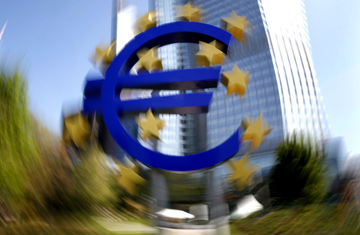
The Euro sculpture, in front of the European Central Bank in Frankfurt
Little, it seems, will convince the markets that Greece is a safe bet. Investors have been jostling the country since the start of the year, raising the cost of Greek debt while forcing the euro down against the dollar. Not even the Greek government's austerity measures or a long-delayed $60 billion rescue package has been able to quell the market jitters. When credit-rating agency Standard & Poor's downgraded Greek debt to junk-bond status on Tuesday, the move sent the markets into a new tailspin. And now, as European Union officials scramble to assure investors that Greece is on the right track, the focus has moved to the euro: Can the single currency be saved before rapacious speculators tear the euro zone apart?
For the moment, at least, the markets have delivered a damning verdict on the efforts to salvage Greece. The interest rate that investors will charge the Greek government to borrow much-needed money on the open market hit 11.3% for 10-year Greek bonds on Wednesday — an all-time high for a euro-zone member. The bailout that Greek Prime Minister George Papandreou asked for last week — with some $40 billion in low-interest loans coming from the euro zone and $20 billion from the International Monetary Fund (IMF) — is already seen as deficient.
How much will it take to rescue the Greek economy? Piero Ghezzi, an economist at Barclays Capital in London, told investors in a briefing note that the magic amount might be $140 billion. German MP Juergen Trittin, head of the Green Party, said it could be as much as $160 billion. And Goldman Sachs' chief European economist, Erik Nielsen, calculated a three-year package worth about $200 billion. Others go further and raise the prospect of default, or as it is more gently termed, debt restructuring.
The E.U. is attempting to stamp out such talk. European Commission President José Manuel Barroso said on Wednesday, "There is no doubt that Greece's needs will be met in time." E.U. President Herman Van Rompuy insisted that euro-zone governments were committed to supporting Greece. And the head of the European Central Bank, Jean-Claude Trichet, said a default was "out of the question."
In Athens, short selling — the practice of selling shares that are predicted to go down so they can be bought back cheaply — has been banned for two months. And the 16 euro-zone leaders will hold an emergency summit on May 10 to activate their share of the $60 billion bailout.
But outside the E.U., officials are more guarded. IMF head Dominique Strauss-Kahn warned on Wednesday that every day lost in resolving the crisis risks spreading the "consequences far away." Angel Gurria, head of the Organization for Economic Co-operation and Development, said the crisis was spreading "like Ebola" and that Europe needed to act immediately to protect the stability of the financial markets. "It's not a question of the danger of contagion; contagion has already happened," Gurria said.
